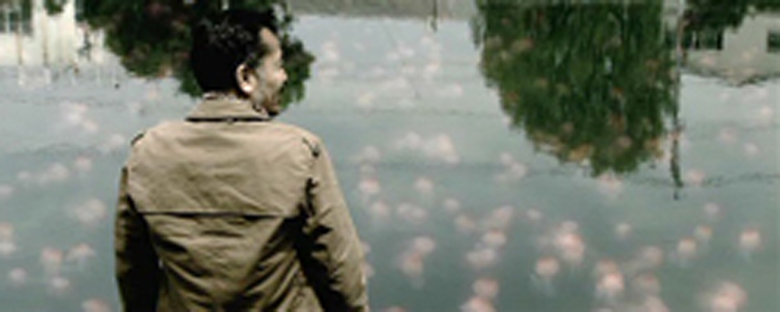Reviews
Akarui mirai
Kiyoshi Kurosawa
Japan, 2003
Credits
Review by Matt Bailey
Posted on 26 October 2004
Source Palm Pictures DVD
Related articles
features: October: 31 Days of Horror
In Kiyoshi Kurosawa’s Bright Future, two friends, young men who work together in a small factory, keep a pet poisonous jellyfish. At first, this does not seem all that promising as a setup to a film. Keeping a creepy pet is the kind of thing you almost expect kids to do these days simply for shock value. My best friend in high school had a pet tarantula and a pet rat. Another friend had a boa constrictor. If I had a friend who had a pet vampire bat, I would not have been surprised. Me, I had a cat. When one friend murders his boss over what amounts to an insult to the jellyfish, though, the movie becomes interesting. When the murderous friend begins instructing the other friend, Mamoru, on how to adapt the jellyfish to fresh water, the film becomes firmly entrenched in Kiyoshi Kurosawa territory. We know something horrible is in the making and we’ve got more than an inkling of what it might be.
As with all of the films of Kiyoshi Kurosawa (no relation to Akira Kurosawa), there are things operating under the surface of the film’s reality that propel the narrative. Kurosawa’s films are not really about what they are about. In Kurosawa’s best known film, Cure, the film is less about mysterious killings than it is about an exploration for some sort of truth in identity. In the case of the often baffling Bright Future, the film is not about a potential terrorist attack by way of killer jellyfish, but about intergenerational conflict and misunderstandings. The jellyfish are something of a philosophical MacGuffin, a way of smuggling big ideas into a small film. Claude Chabrol has done something similar for years, teasing out themes of morality from twisty murder mysteries and it is something that Kurosawa has explored in most of his films. Here, Mamoru, while training his jellyfish to live in fresh water, attempts to act as the son his friend’s father lost to madness. The unease provoked from the film comes not from a gentle young man considering releasing deadly jellyfish into Japan’s public waterways; it comes from the thematic conflict between this horrific thought and the same man’s thoughts of kindness and love toward an old man of no relation. That the film succeeds on the level of a thriller as well as of a philosophical reflection is a proof of Kurosawa as perhaps the best Japanese filmmaker of his generation.
We don’t do comments anymore, but you may contact us here or find us on Twitter or Facebook.



